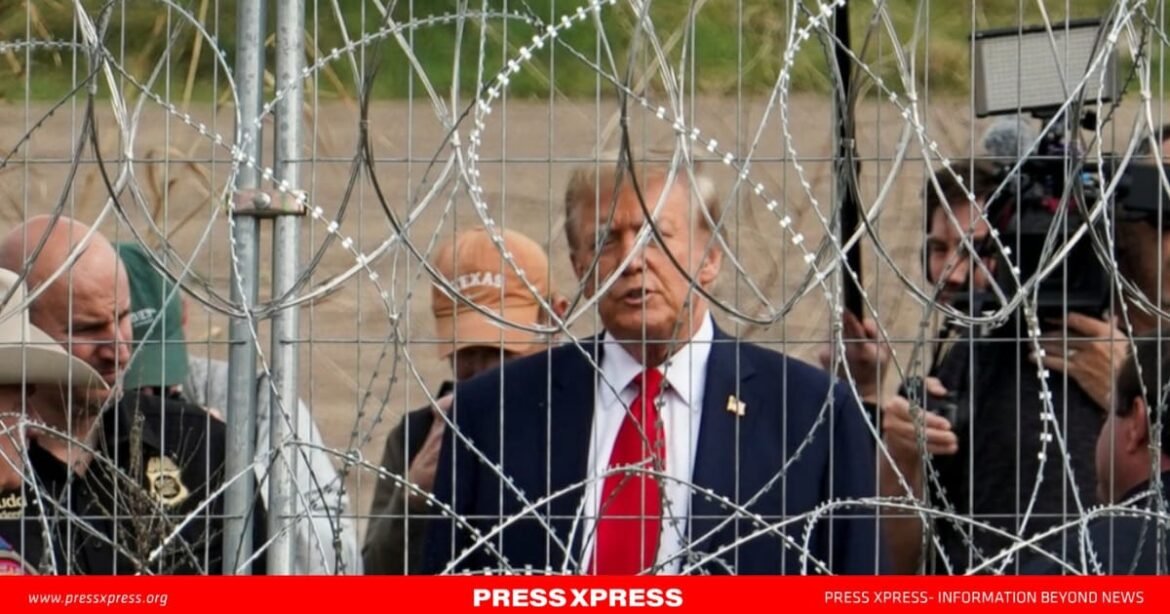Donald Trump has announced plans to impose significant tariffs on goods from China, Mexico, and Canada as soon as he takes office, aiming to pressure these countries to combat illegal immigration and drug trafficking into the United States.
The president-elect stated he would sign an executive order on January 20, 2025, mandating a 25% tariff on all goods imported from Mexico and Canada. Additionally, Trump plans to levy a 10% tariff on Chinese goods “on top of any existing tariffs” unless Beijing intensifies efforts to stop fentanyl smuggling.
These proposed measures could escalate tensions with three of the United States’ largest trading partners and potentially drive up prices for American consumers. Tariffs act as a tax on imports, and with China, Mexico, and Canada accounting for about 40% of the $3.2 trillion in U.S. annual imports, the impact could be significant.
Reactions from Affected Nations
China, a major target of the proposed tariffs, defended its efforts to curb illegal drug flows and warned against the risks of a trade war, which it described as a lose-lose situation.
Following the announcement, Trump spoke with Canadian Prime Minister Justin Trudeau in a 10-minute call that reportedly addressed trade and border security. Trudeau emphasized that the number of migrants crossing Canada’s border is significantly lower than those entering via the U.S.-Mexico border.
Mexico’s finance ministry highlighted the importance of the US-Mexico-Canada Agreement (USMCA), which provides a stable framework for trade and investment. “Mexico is the United States’ top trade partner,” the ministry noted.
Tariffs as a Tool of Pressure
Trump shared on Truth Social that the tariffs on Mexico and Canada would remain until both nations effectively address illegal drug trafficking and migration. “Mexico and Canada have the power to solve this problem easily,” he wrote, adding that it is time for these countries to “pay a very big price.”
In a separate post, Trump criticized China for allegedly not honoring commitments to enforce harsh penalties, including the death penalty, for fentanyl trafficking. A spokesperson for China’s embassy in Washington refuted the allegations, describing them as contrary to reality.
The Biden administration has also pressured Beijing to crack down on fentanyl production, citing nearly 75,000 fentanyl-related deaths in the U.S. last year.
Economic Implications
Trump’s proposed tariffs could severely disrupt global supply chains and strain relations with key trading partners. During his campaign, Trump threatened tariffs of up to 100% on Mexico and China if deemed necessary, far exceeding those from his first term. He has also pledged to revoke China’s “most-favored-nation” trade status with the U.S.
In 2023, over 80% of Mexico’s exports and approximately 75% of Canada’s exports went to the U.S., while the U.S. accounted for about 15% of China’s exports despite an ongoing trade dispute.
How Tariffs Work
Tariffs are taxes imposed on imported goods based on their value. For instance, a $50,000 car subject to a 25% tariff would face an additional $12,500 charge. While Trump claims tariffs shift costs to exporting countries, economists argue that domestic businesses and consumers typically bear the financial burden. Studies from Trump’s first term indicate most tariff costs were passed on to American consumers.
It remains unclear if Trump’s proposed 10% tariff on China would be added to the 25% planned for Mexico and Canada.
Strategic Intent
Experts suggest Trump’s tariff threats align with his broader strategy to use economic measures as leverage for achieving policy goals. According to Stephen Roach, a Senior Fellow at Yale Law School, the move is consistent with Trump’s campaign promises to weaponize tariffs for policy enforcement.
Scott Bessent, Trump’s pick for Treasury Secretary, views the tactic as a negotiation tool. “At the end of the day, he’s a free trader,” Bessent remarked in an interview, describing the approach as “escalate to de-escalate.”
Challenges Ahead
The Chinese economy, weakened by a property crisis, low domestic demand, and rising government debt, is in a more vulnerable position compared to Trump’s previous presidency. However, imposing tariffs may violate the USMCA, which was signed into law under Trump in 2020 to ensure duty-free trade between the three nations.
The proposed tariffs have drawn criticism both domestically and abroad. Ontario Premier Doug Ford warned that such measures would devastate jobs and industries in both Canada and the U.S. Meanwhile, Gerardo Fernández, leader of the Mexican Senate, questioned whether Mexico should impose retaliatory tariffs on American goods, citing U.S. drug consumption and illegal weapon exports.
Trump’s bold stance on tariffs signals a commitment to his campaign promises but raises significant concerns about the potential economic fallout and strain on international relations.


